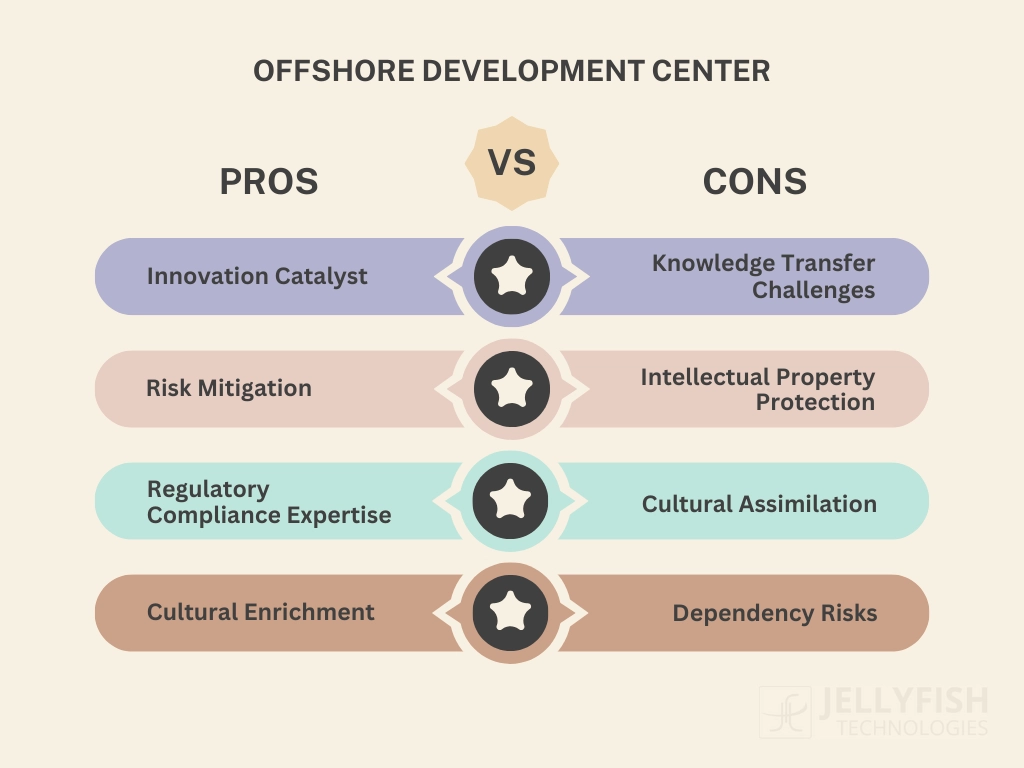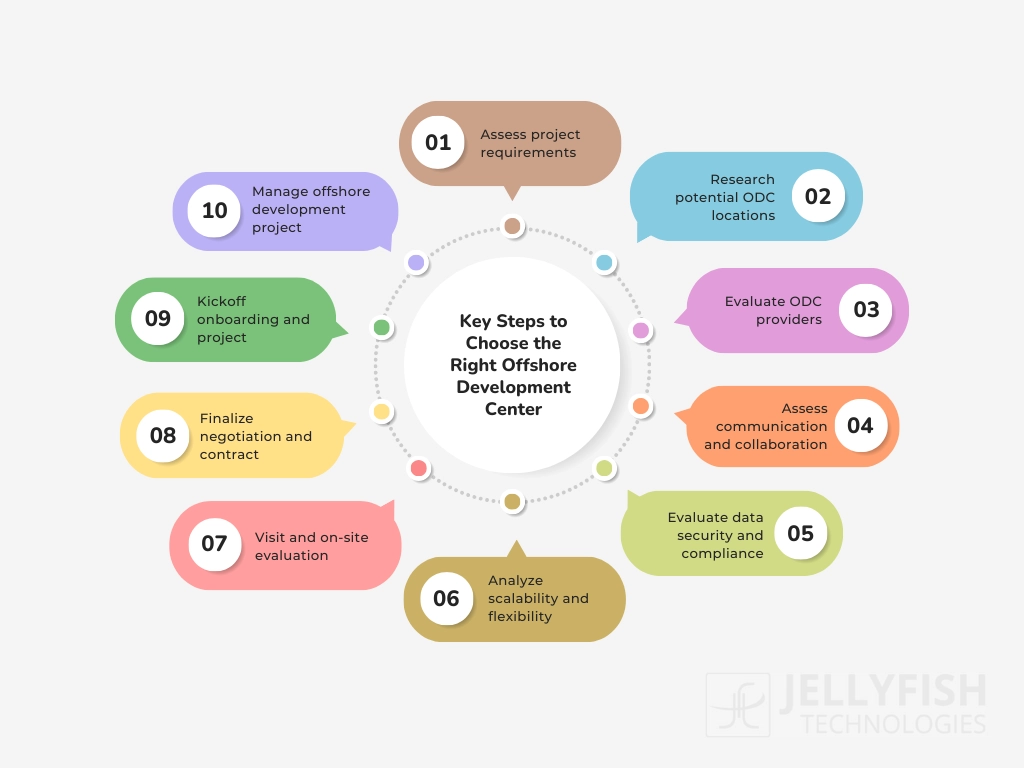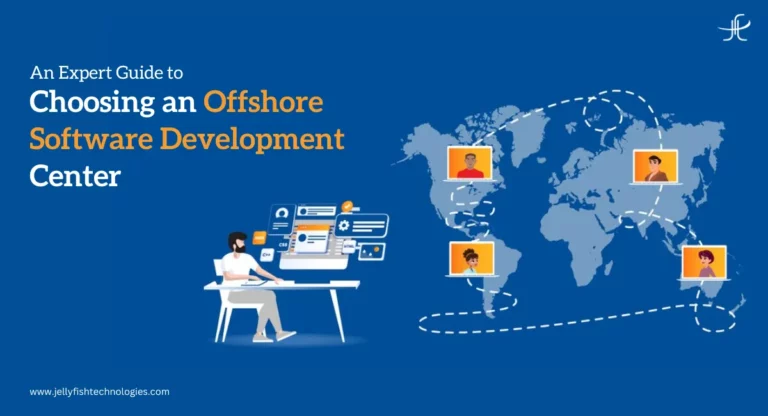According to Korn Ferry, a consulting firm, by 2030, there will be a shortage of over 85 million tech workers globally, leading to a loss of about $8.5 trillion in annual revenue.
That’s a big deal!
Well, this shortage is driving a new trend in global IT: outsourcing to Offshore Development Centers (ODCs).
With this model, businesses can tap into a global talent pool and get high-quality work done, all while having the flexibility to adapt to different market situations.
But here’s the thing, not all offshore development centers are created equal. There are different types of providers out there, and choosing the right one is crucial.
By the time you finish reading this article, you’ll have all the information you need about working with an ODC and how to pick the perfect partner for your business.
Let’s dive in!
What Is an Offshore Development Center (ODC)?
An offshore development center is like an offsite office located outside your company’s country. You might also hear it called an offshore software development center, an offshore development team, or an offshore software team.
Companies set up ODCs to outsource some or all of their software development or IT work to a cost-effective location, either to save money or to access specialized expertise. Although, the company doesn’t put together this center instead, it’s set up and run by a partner company.
The partner company takes care of making sure everything runs smoothly, from setting up the right infrastructure to ensuring the team has everything they need to do their best work.
Difference Between Offshore Development Center and Outsourcing
In the realm of software development, offshore development centers (ODCs) and outsourcing represent two distinct approaches with nuanced differences. ODCs operate as extensions of the hiring company’s operations, allowing for greater control and integration into the company’s culture and processes. In contrast, outsourcing entails delegating specific tasks or projects to external vendors, resulting in less direct control and integration. While ODCs foster long-term partnerships aimed at continuous collaboration and support, outsourcing arrangements are often project-based, with defined scopes and timelines.

One of the key distinctions between ODCs and outsourcing lies in resource allocation and scalability. ODCs offer flexibility in resource allocation and scalability, allowing the hiring company to adjust team sizes, skill sets, and project scopes as needed. In contrast, outsourcing may provide limited flexibility, requiring renegotiation of contracts or engagement of additional vendors for scaling.
Let us now learn some of the top advantages and disadvantages of setting up a dedicated offshore development center.
Advantages and Disadvantages of Establishing an Offshore Development Center
Advantages
Innovation Catalyst: Offshore development centers often serve as hubs of innovation, fostering collaboration, cross-pollination of ideas, and out-of-the-box thinking. By bringing together diverse talent from different cultural and professional backgrounds, ODCs can spark creativity and drive breakthrough solutions.
Risk Mitigation: Offshore development centers can serve as a valuable risk mitigation strategy, particularly in scenarios where geopolitical or economic factors impact local operations. By diversifying development activities across multiple locations, companies can reduce dependency on any single market or region, thereby enhancing resilience and business continuity.
Regulatory Compliance Expertise: A dedicated offshore development center in certain regions specializes in navigating complex regulatory landscapes, including industry-specific regulations and international compliance standards. Partnering with such centers can help companies navigate regulatory challenges more effectively, ensuring adherence to legal requirements and minimizing compliance-related risks.
Cultural Enrichment: Collaborating with offshore software development centers offers a unique opportunity for cultural enrichment and cross-cultural exchange. By fostering an inclusive work environment that celebrates diversity and cultural differences, companies can cultivate a global mindset among their employees, enriching organizational culture and enhancing employee engagement and satisfaction.
Disadvantages
Knowledge Transfer Challenges: Transferring tacit knowledge and domain expertise from onshore teams to offshore counterparts can pose significant challenges, particularly in complex or specialized domains. Effective knowledge management strategies, including documentation, mentorship programs, and cross-functional training sessions, are essential to mitigate knowledge transfer gaps and ensure continuity of operations.
Intellectual Property Protection: Offshore development centers may operate in jurisdictions with different intellectual property (IP) laws and enforcement mechanisms, raising concerns about IP protection and confidentiality. Implementing robust IP protection measures, such as non-disclosure agreements (NDAs), proprietary software licenses, and contractual clauses, is crucial to safeguarding proprietary information and preventing unauthorized use or disclosure.
Cultural Assimilation: Integrating offshore teams into the organizational culture and aligning them with company values, goals, and norms can be challenging, particularly in multicultural settings. Building a strong sense of belonging and shared purpose among offshore and onshore employees requires proactive communication, cultural sensitivity training, and leadership support to bridge cultural gaps and foster a cohesive team environment.
Dependency Risks: Overreliance on offshore development partners or a single offshore development center can expose companies to dependency risks, such as vendor lock-in, limited flexibility, and reduced bargaining power. Adopting a diversified sourcing strategy, engaging multiple offshore partners, and periodically reassessing vendor relationships can help mitigate dependency risks and maintain strategic agility in a rapidly evolving business landscape.
You may like this: Pros and Cons of Establishing an Offshore Development CenterCommon Misconceptions About Offshore Development Centers
Despite the numerous benefits they offer, offshore development centers (ODCs) are often subject to misconceptions that can cloud judgment and hinder decision-making.
Lack of Quality
One prevalent misconception is that offshore development centers compromise on quality. However, reputable ODCs adhere to stringent quality standards and employ skilled professionals capable of delivering high-quality solutions on par with onshore teams.
Loss of Control
Some businesses fear that outsourcing development activities to an offshore development center will result in a loss of control over the project. In reality, ODC partnerships are built on mutual trust and collaboration, with the hiring company retaining oversight and direction throughout the development process.
Security Concerns
Security concerns often deter businesses from leveraging offshore development services, fearing data breaches and confidentiality breaches. However, reputable ODCs prioritize data security and compliance, implementing robust measures to safeguard sensitive information and mitigate security risks.
Limited Talent Pool
There is a misconception that offshore locations lack access to a diverse talent pool with the necessary skills and expertise. In reality, offshore destinations like India boast a vast pool of highly skilled professionals across various domains, offering businesses access to top-tier talent.
Cost Savings Only
While cost savings are a significant advantage of offshore development, it is a misconception to view ODCs solely as a means to reduce expenses. Beyond cost savings, ODCs offer strategic advantages, such as access to specialized expertise, scalability, and flexibility to adapt to changing business needs.
Two Major Types of Offshore Development Center Models
When considering the establishment of an offshore development center (ODC), businesses typically encounter two primary models.
Managed ODC
In a Managed ODC model, the entire operation, including infrastructure setup, team recruitment, project management, and ongoing maintenance, is handled by a third-party service provider. This model offers businesses a hands-off approach, allowing them to focus on core operations while leveraging the expertise of the service provider to manage the offshore development activities efficiently.
Build-Operate-Transfer (BOT)
The Build-Operate-Transfer (BOT) model involves a phased approach to establishing an ODC. Initially, the service provider sets up the ODC infrastructure, recruits and trains the team, and manages day-to-day operations on behalf of the hiring company. Over time, as the ODC matures and the hiring company gains confidence in its capabilities, ownership and control gradually transition to the company. This model offers businesses a gradual transition to full ownership and control of the offshore development operations, providing flexibility and control over the long term.
Key Steps to Choose the Right Offshore Development Center
Here are 10 crucial steps to guide you in choosing the ideal offshore development center (ODC) for your project.

Step 1: Assess project requirements
Begin by clearly defining your project objectives, scope, and requirements. Determine the specific expertise and resources needed to ensure the success of your offshore development endeavor.
Step 2: Research potential ODC locations
Conduct thorough research on potential offshore locations, considering factors, such as time zone compatibility, cultural affinity, language proficiency, and cost-effectiveness. Offshore destinations like India are renowned for their vast talent pool and cost-efficient services.
Step 3: Evaluate ODC providers
Screen and evaluate multiple ODC providers based on their track record, industry experience, client testimonials, and portfolio of services. Look for providers with a proven track record of delivering high-quality solutions within your industry domain.
Step 4: Assess communication and collaboration
Assess the communication infrastructure and collaboration tools offered by offshore development center providers to ensure seamless interaction and coordination between onshore and offshore teams. Effective communication channels are crucial for project success.
Step 5: Evaluate data security and compliance
Prioritize data security and compliance by evaluating the offshore development center provider’s adherence to industry standards and regulatory requirements. Ensure robust measures are in place to safeguard sensitive information and maintain data confidentiality.

Step 6: Analyze scalability and flexibility
Assess the scalability and flexibility of the ODC model to accommodate changing project requirements and business needs. Look for providers capable of scaling resources up or down swiftly and efficiently.
Step 7: Visit and on-site evaluation
Consider visiting the offshore development center location for an on-site evaluation of facilities, infrastructure, and team capabilities. This firsthand experience can provide valuable insights into the working environment and team dynamics.
Step 8: Finalize negotiation and contract
Negotiate terms and finalize contractual agreements with the selected ODC provider. Ensure all key aspects, including pricing, deliverables, timelines, and performance metrics, are clearly defined and documented in the contract.
Step 9: Kickoff onboarding and project
Initiate the onboarding process and kick off the project by aligning teams, setting expectations, and establishing project milestones. Foster open communication and collaboration channels to promote a smooth transition and project launch.
Step 10: Manage offshore development project
Implement robust project management practices to oversee the offshore development project effectively. Maintain regular communication, monitor progress, address any issues promptly, and ensure alignment with project goals and objectives.
By following these 10 steps diligently, one can navigate the process of choosing a dedicated offshore development center (ODC) with confidence and set the stage for a successful and fruitful collaboration.
To Sum Up
As businesses navigate the complex landscape of offshore development, strategic foresight, meticulous planning, and effective execution are paramount.
By leveraging best practices, embracing industry insights, and forging strategic partnerships, businesses can harness the full potential of offshore development to drive innovation, accelerate growth, and achieve sustained competitive advantage in an increasingly interconnected world.
As we look to the future, the strategic importance of offshore development centers will continue to grow, empowering businesses to thrive amidst uncertainty and seize new opportunities for success.
Jellyfish Technologies, as an offshore development center in India, stands ready to support businesses in their journey towards digital transformation.
With a team of skilled professionals, state-of-the-art infrastructure, and a commitment to delivering high-quality solutions, we offer a comprehensive suite of offshore development services tailored to meet the unique needs and challenges of modern businesses.
From software development and IT operations to regulatory compliance and cultural integration, Jellyfish Technologies serves as a trusted partner in driving innovation, maximizing efficiency, and achieving sustainable growth.
We’re all ears for your thoughts on the post! Got something else on your mind? Don’t hesitate to shoot us a message through our contact page. Let’s keep the conversation going!


